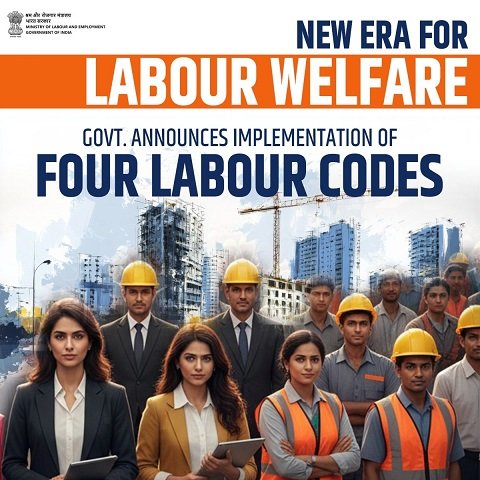
Last Updated on November 22, 2025 12:27 pm by BIZNAMA NEWS
AMN / New Delhi
Industry bodies, trade unions and consulting firms have widely welcomed the rollout of India’s four new labour codes, calling the move a landmark reform that will expand social security, boost formal job creation and simplify decades-old labour regulations.
The Code on Wages (2019), Industrial Relations Code (2020), Code on Social Security (2020) and Occupational Safety, Health and Working Conditions Code (2020) came into force yesterday, replacing a complex web of earlier laws with a unified, streamlined framework. The reforms aim to modernise India’s labour landscape by ensuring fair wages, improved safety standards and long-term protection for workers across sectors.
Industry leaders across technology, staffing, consulting and legal services said the implementation is timely and essential for a fast-evolving economy. They noted that the simplified compliance structure will not only support businesses but also strengthen workers’ rights.
The Bharatiya Mazdoor Sangh (BMS) hailed the rollout as a milestone. BMS National Secretary Girish Arya described it as the biggest pro-worker reform since Independence, adding that the new system will empower labourers and make compliance significantly easier for employers.
Echoing similar sentiments, Dr. Deepak Jaiswal, President of the National Front of Indian Trade Unions (NFITU), highlighted that nearly 50 crore unorganised sector workers will now see their minimum wages fully ensured. He also underlined that the Codes guarantee equal pay for equal work for women, and bring comprehensive updates to health and safety norms that were long overdue.
The technology industry’s apex body Nasscom said that the notification of key provisions represents an important milestone in India’s labour reform journey. Clearer rules on wages, safety and social security, it said, will help strengthen the workforce. Nasscom also committed to working closely with all stakeholders to ensure a smooth transition.
The Indian Staffing Federation termed the reform “unequivocally positive,” noting that the Codes extend social security to gig and platform workers, establish universal minimum wages, and introduce portable benefits for migrant workers—an important advancement for a mobile workforce.
The International Social Security Association (ISSA) appreciated India’s initiative, saying that the Labour Codes contribute to global momentum toward more inclusive and robust social security systems. ISSA encouraged continued investment in expanding coverage, protection and administrative capacity.








